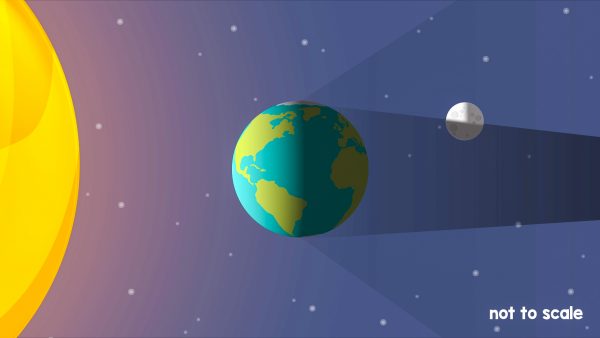Lunar Eclipse Definition
A lunar eclipse occurs when the Moon moves into Earth's shadow. For example, a total lunar eclipse completely covers the Moon with Earth's shadow.
View Lesson on Solar & Lunar Eclipses
Become a member to get full access to our entire library of learning videos, reading material, quiz games, simple DIY activities & more.
Become a member to get full access to our entire library of learning videos, quiz games, & more.
Plans & Pricingto watch this full video.

Access All Videos
and Lessons, No Limits.
Access All Videos

No credit card required,
takes 7 sec to signup.
No card required

Ready-to-go lessons
that save you time.
Ready-to-go lessons
If you are on a school computer or network, ask your tech person to whitelist these URLs:
*.wistia.com, fast.wistia.com, fast.wistia.net, embedwistia-a.akamaihd.net
Sometimes a simple refresh solves this issue. If you need further help, contact us.
Solar & Lunar Eclipses
Fun Facts
- Lunar eclipses can occur only when the Moon is full.
- Total lunar eclipses occur about once every two years.
- A Blood Moon appears reddish during a total lunar eclipse.
Why Do We Need To Know About Lunar Eclipse
Learning about lunar eclipses helps us see why space scientists, called astronomers, find them exciting. These scientists study space and learn about distant planets by watching how they move in front of stars, blocking some of their light, which looks a bit like an eclipse from far away.
This technique has helped find more than 2000 planets, and some of these could even have life, like the planet Kepler 62F. So, understanding eclipses is not just cool, but it’s also key to finding new worlds and maybe even life outside our planet.
Frequently Asked Questions
Check out the Full Lesson on Solar & Lunar Eclipses
In this lesson, we learn that:
- A model of the solar system can explain eclipses of the sun and the moon.
- A solar eclipse happens when our view of the sun is blocked by the moon.
- A lunar eclipse happens when the moon passes into Earth's shadow.
Related Topics
- Air Mass Definition
- Analog Signal Definition
- Astronomy Definition
- Balanced Force Definition
- Chromosome Definition
- Climate Definition
- Coastal Erosion Definition
- Condensation Definition
- Conductor Definition
- Convection Definition
- Corona Definition
- Decomposer Definition
- Definition Of Evidence
- Definition Of Human Body Systems
- Definition Of Non-living Things
- Electron Definition
- Element Definition
- Fossil Record Definition
- Freezing Definition
- Gas Definition
- Geosphere Definition
- Glacier Definition
- Heat Definition
- Lever Definition
- Light Year Definition
- Lunar Eclipse Definition
- Mutualism Definition
- Natural Resource Definition
- Ocean Current Definition
- Partial Eclipse Definition
- Pollinator Definition
- Reactants Definition
- Recycle Definition
- Renewable Resource Definition
- Season Definition
- Smelling Definition
- Soil Definition
- Solar Eclipse Definition
- Solution Definition
- Sunlight Definition
- Temperature Definition
- Thermal Energy Definition
- Tissue Definition
- Total Eclipse Definition
- Translucent Definition
- Virus Definition
- Water Distribution Definition
- Weather Front Definition


Start a Free Trial Today. Get a $5 Amazon Gift Card!
Teachers! Start a free trial & we'll send your gift card within 1 day. Only cards left. Try it now.
Select Grade
Select Subject
This email is associated with a Science Kit subscription. Kit subscriptions are managed on this separate page: Manage Subscription

-
Download InvoiceScience & Math$/yr
-
Download InvoiceScience Only$/yr

access all lessons
• No credit card required •
"My students loved the videos. I started the video subscription in May and used them as a review before the state test, which I know contributed to 100% of my class passing the state test."
Rhonda Fox 4th Grade Teacher, Ocala, Florida
Use Generation Genius in Your School
Access all lessons free for 30 days.
"My students loved the videos. I started the video subscription in May and used them as a review before the state test, which I know contributed to 100% of my class passing the state test."
Rhonda Fox 4th Grade Teacher, Ocala, Florida
• No credit card required •
Already a member? Sign In
* no credit card required *

* no credit card required *
* no credit card required *

Get District Quote
Discounts start at 3 schools.
Sent!
Thank you for your inquiry.
We will email you a quote as soon as we can.

to Discover the Benefits of Generation Genius
Learn How to Save for Your School & District!
Please login or create an account to access additional resources

no credit card required
Skip, I will use a 3 day free trial
Enjoy your free 30 days trial
-
Unlimited access to our full library
of videos & lessons for grades K-5. -
You won’t be billed unless you keep your
account open past your 14-day free trial. -
You can cancel anytime in 1 click on the
manage account page or by emailing us.
-
Unlimited access to our full library of videos & lessons for grades K-5.
-
You won't be billed unless you keep your account open past 14 days.
-
You can cancel anytime in 1-click on the manage account page.
Cancel anytime in 1-click on the manage account page before the trial ends and you won't be charged.
Otherwise you will pay just $10 CAD/month for the service as long as your account is open.
Cancel anytime on the manage account page in 1-click and you won't be charged.
Otherwise you will pay $10 CAD/month for the service as long as your account is open.
We just sent you a confirmation email. Enjoy!
Done



























































































































 GENERATION GENIUS
GENERATION GENIUS